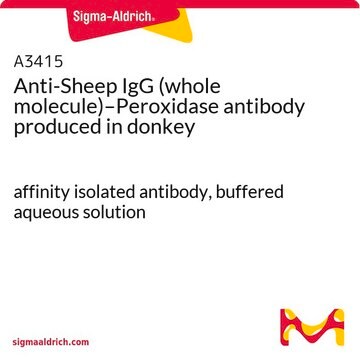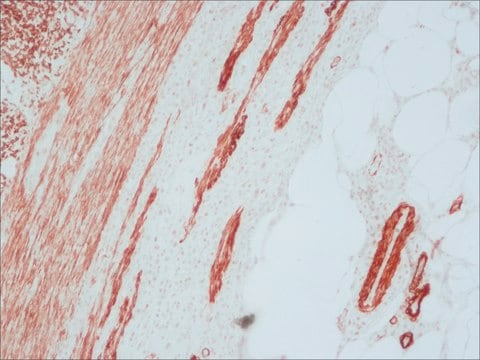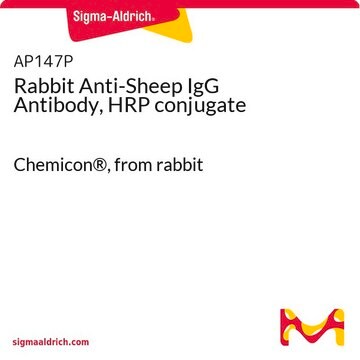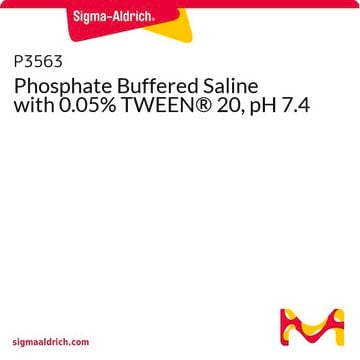B7014
Anti-Goat IgG (whole molecule)–Biotin antibody produced in rabbit
affinity isolated antibody, buffered aqueous solution
Sign Into View Organizational & Contract Pricing
All Photos(2)
About This Item
Recommended Products
biological source
rabbit
Quality Level
conjugate
biotin conjugate
antibody form
affinity isolated antibody
antibody product type
secondary antibodies
clone
polyclonal
form
buffered aqueous solution
technique(s)
direct ELISA: 1:20,000
storage temp.
−20°C
target post-translational modification
unmodified
Looking for similar products? Visit Product Comparison Guide
General description
An immunoglobulin has two heavy chain and two light chain connected by disulfide bond. It is a glycoprotein. IgG is a major class of immunoglobulin. Goat IgG has two subclasses- IgG1 and IgG2.
Goat IgG is often used for the detection and study of various proteins such as EPAS1 and MIP-3 α among several others. Anti-goat IgG (whole molecule)-Biotin antibody can be used as a secondary antibody to facilitate the detection of such target proteins bound to goat IgGs by immunological assays . Thus, anti-goat IgGs are useful tools for the analysis of target proteins. Anti-Goat IgG (whole molecule)-Biotin antibody is specific for IgG in goats.
Immunogen
Goat IgG
Application
Anti-Goat IgG (whole molecule)-Biotin antibody produced in rabbit has been used:
- immunohistochemistry
- immunostaining
- western blot
- immunofluorescence
- immunohistochemical studies
Biochem/physiol Actions
Immunoglobulin G (IgG) participates in hypersensitivity type II and type III. It mainly helps in immune defense.
Physical form
Solution in 0.01 M phosphate buffered saline, pH 7.4, containing 1% bovine serum albumin and 15 mM sodium azide
Disclaimer
Unless otherwise stated in our catalog or other company documentation accompanying the product(s), our products are intended for research use only and are not to be used for any other purpose, which includes but is not limited to, unauthorized commercial uses, in vitro diagnostic uses, ex vivo or in vivo therapeutic uses or any type of consumption or application to humans or animals.
Not finding the right product?
Try our Product Selector Tool.
Storage Class Code
10 - Combustible liquids
WGK
nwg
Certificates of Analysis (COA)
Search for Certificates of Analysis (COA) by entering the products Lot/Batch Number. Lot and Batch Numbers can be found on a product’s label following the words ‘Lot’ or ‘Batch’.
Already Own This Product?
Find documentation for the products that you have recently purchased in the Document Library.
Propulsive appliance stimulates the synthesis of insulin-like growth factors I and II in the mandibular condylar cartilage of young rats
Hajjar D, et al.
Archives of Oral Biology, 48(9), 635-642 (2003)
Physiological role of macrophage inflammatory protein-3alpha induction during maturation of intestinal macrophages
Hausmann M, et al.
Journal of immunology (Baltimore, Md. : 1950), 175(3), 1389-1398 (2005)
Stable expression of a secretable deletion mutant of recombinant human thrombomodulin in mammalian cells.
Parkinson JF, et al.
The Journal of Biological Chemistry, 265(21), 12602-12610 (1990)
Diana Borenshtein et al.
Genome biology, 9(8), R122-R122 (2008-08-06)
Comparative characterization of genome-wide transcriptional changes during infection can help elucidate the mechanisms underlying host susceptibility. In this study, transcriptional profiling of the mouse colon was carried out in two cognate lines of mice that differ in their response to
D F Alonso et al.
Breast cancer research and treatment, 40(3), 209-223 (1996-01-01)
Urokinase-type plasminogen activator (uPA) initiates an extracellular proteolytic cascade with which invasive cells eliminate barriers to movement. We have evaluated the antiinvasive and antimetastatic properties of two recently developed synthetic uPA inhibitors, B428 and B623, in a BALB/c mouse mammary
Our team of scientists has experience in all areas of research including Life Science, Material Science, Chemical Synthesis, Chromatography, Analytical and many others.
Contact Technical Service








